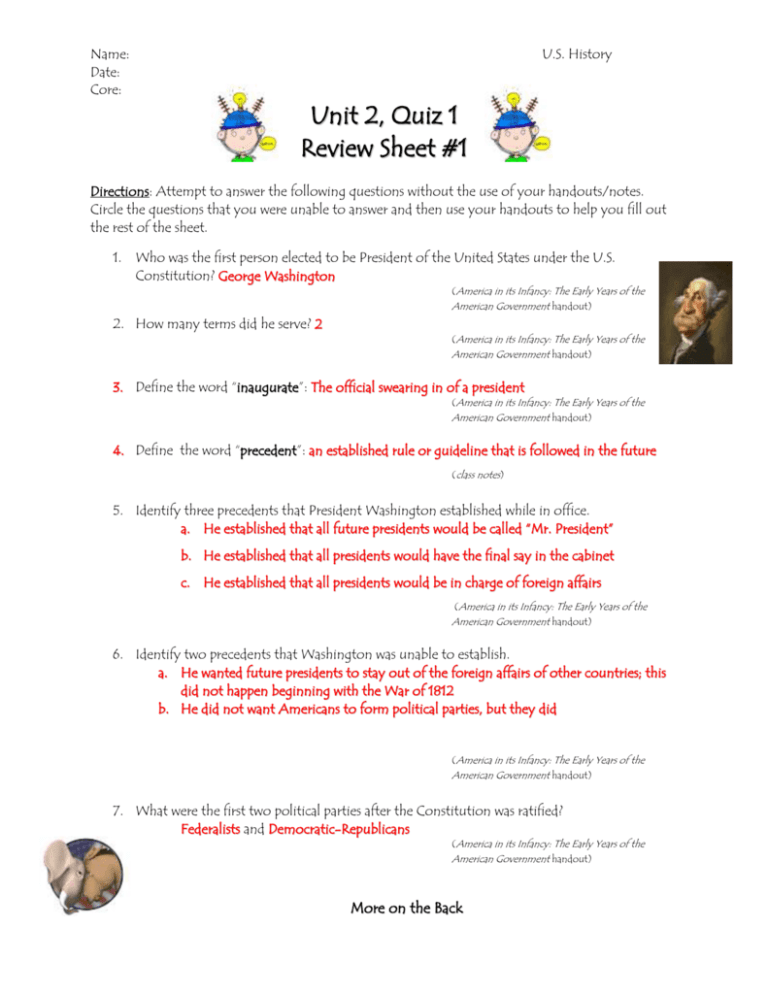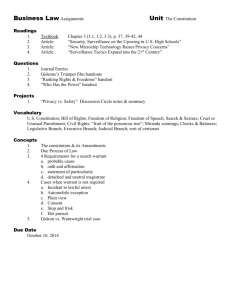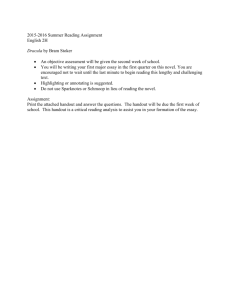Unit 2, Quiz 1 Review Sheet #1
advertisement

Name: Date: Core: U.S. History Unit 2, Quiz 1 Review Sheet #1 Directions: Attempt to answer the following questions without the use of your handouts/notes. Circle the questions that you were unable to answer and then use your handouts to help you fill out the rest of the sheet. 1. Who was the first person elected to be President of the United States under the U.S. Constitution? George Washington (America in its Infancy: The Early Years of the American Government handout) 2. How many terms did he serve? 2 (America in its Infancy: The Early Years of the American Government handout) 3. Define the word “iinaugurate”: The official swearing in of a president (America in its Infancy: The Early Years of the American Government handout) 4. Define the word “p precedent”: an established rule or guideline that is followed in the future (class notes) 5. Identify three precedents that President Washington established while in office. a. He established that all future presidents would be called “Mr. President” b. He established that all presidents would have the final say in the cabinet c. He established that all presidents would be in charge of foreign affairs (America in its Infancy: The Early Years of the American Government handout) 6. Identify two precedents that Washington was unable to establish. a. He wanted future presidents to stay out of the foreign affairs of other countries; this did not happen beginning with the War of 1812 b. He did not want Americans to form political parties, but they did (America in its Infancy: The Early Years of the American Government handout) 7. What were the first two political parties after the Constitution was ratified? Federalists and Democratic-Republicans (America in its Infancy: The Early Years of the American Government handout) More on the Back 8. How were the two parties different in their belief about repaying the American Revolutionary War debts? The Federalists belief about repaying the American Revolutionary War debts The federal government should issue a tariff and the money raised from that tax would be used to pay off each state’s war debt The Democratic-Republicans belief about repaying the American Revolutionary War debts Each individual state should be responsible for paying off its own war debts (America in its Infancy: The Early Years of the American Government handout) 9. What is a strict interpretation of the Constitution? The belief that the government only possessed the powers that were specifically written into the Constitution. If the Constitution doesn’t say it, than the government can’t do it. (America in its Infancy: The Early Years of the American Government handout) 10. What is a loose interpretation of the Constitution A much broader interpretation of the Constitution. The belief that as long as the Constitution did not prohibit a certain power, then the federal government had the right to use that power. (America in its Infancy: The Early Years of the American Government handout) 11. Which party believed that the federal government had the power to establish a national bank? Briefly explain how this belief is connected to their interpretation of the Constitution. The Federalists believed that the government had this power. Even though it did not spefically say so in the Constitution, it also did not forbid the government from doing this (America in its Infancy: The Early Years of the American Government handout) 12. What were the Alien & Sedition Acts of 1798? A series of 4 laws aimed at limiting the power of the Democratic-Republicans. The laws made it illegal to criticize the government in any way. (Personal Freedoms v. National Security: The Alien & Sedition Acts of 1798 handout 13. Were the acts constitutional or unconstitutional in your opinion? Explain. These acts were unconstitutional because they violated the 1st Amendment (right to petition a greviance against the government) (Personal Freedoms v. National Security: The Alien & Sedition Acts of 1798 handout 14. Define the word “n nullify”. To make void, ban (Personal Freedoms v. National Security: The Alien & Sedition Acts of 1798 handout)





